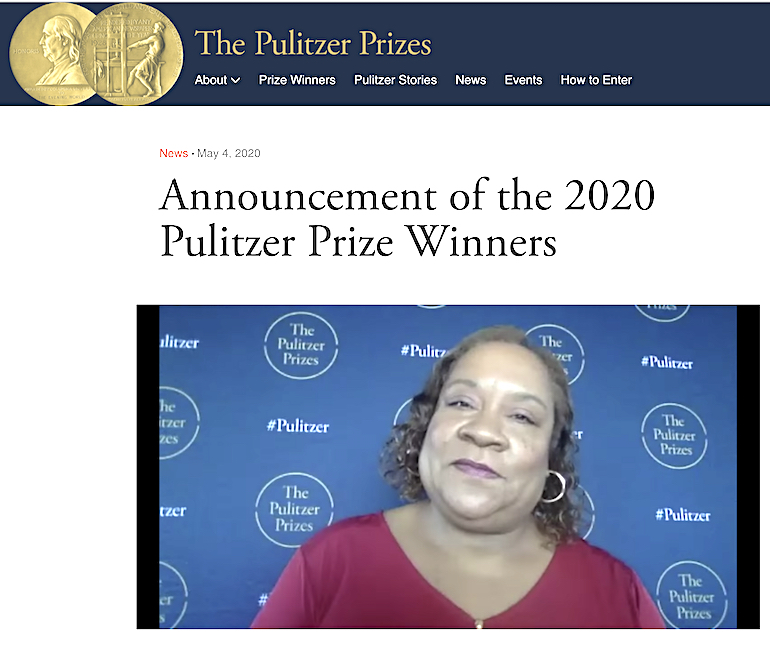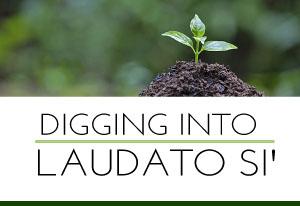
Pulitzer Prize Administrator Dana Canedy announcing this year's winners from her living room (EarthBeat screengrab)
EarthBeat Weekly
Your weekly newsletter about faith and climate change
May 8, 2020
Along with everything else these days, the awarding of the Pulitzer Prizes this week unfolded quite differently than usual. Instead of announcing the winners from an august setting at Columbia University in Manhattan, prize administrator Dana Canedy broke the big news from her living room.
Even more striking were the stories she celebrated. As Kristen Hare of Poynter noted, coverage of climate change captured more Pulitzer recognition this year than perhaps ever before: a winner and several finalists. So this week we'll venture a bit outside the lines of our usual focus on faith and climate to share some extraordinary climate journalism with you.
What stands out is not just the depth of reporting but the quality of multi-media presentation. These stories were produced in ways that engage readers and enhance understanding of complex topics.
Take The Washington Post's winning entry in the Explanatory Reporting category, described by the judges as "a groundbreaking series that showed with scientific clarity the dire effects of extreme temperatures on the planet."
The Post analyzed more than a century of U.S. temperature data and found that major areas – home to ten percent of the country's population – are nearing or have already crossed the critical 2-degree Celsius mark. That's the temperature the U.N.'s Intergovernmental Panel on Climate Change warns that, if exceeded globally, would kill off virtually all coral reefs and unleash massive sea level rise as a result of retreating ice sheets in Greenland and Antarctica.
I found myself especially hooked by the way The Post tells this story, "How we know global warming is real."
If you're not a subscriber to these publications, you may be asked to register or subscribe. There are usually inexpensive introductory offers available, and there's no better time than now to support independent journalism. In some cases, the Pulitzer organization has pasted the stories onto its own site.
Here's some of the other work that received Pulitzer recognition this week:
- An examination of sea rise in California by the Los Angeles Times was a finalist in the Explanatory Journalism category. Don't miss The Ocean Game, an interactive feature with the tagline: "The sea is rising. Can you save your town?"
- "Not this mine. Not this location." That's the headline on a piece written by Jill Burcum of the Star Tribune in Minneapolis. She was named which a finalist in Editorial Writing. Most papers still don't run photos with editorials. Burcum's was accompanied by extraordinary photojournalism.
- I first observed the Boston Globe's "At the Edge of a Warming World" on a big screen in a Boston University auditorium last year, underlining the sort of new outlets that news organizations are discovering for their work. The video on the opening page of the story online takes you over a bridge to Cape Cod, where the Globe documented the severe impact of climate change already underway. The Globe's Nestor Ramos was a finalist in the Feature Writing category for this work.
- The Wall Street Journal was a finalist in the National Reporting category for PG&E: Wired to Fail, coverage that established the utility's culpability in aggravating circumstances already worsened by drought and climate change.
- The most prestigious Pulitzer is the award for Public Service, won this year by the Anchorage Daily News with contributions from ProPublica for reporting that found a third of Alaska's villages had no policy protection. The New York Times was a finalist in that category for reporting documenting the Trump Administration's war on science, especially in the area of environmental protection.
Here's some of what's new on EarthBeat this week:
- Staff writer Brian Roewe has been tracking the fate of toxic oil wells in a Los Angeles neighborhood for years. This week he reported that it finally looks as if the wells will be closed for good, no thanks to the owner of the land they sit on – the Archdiocese of Los Angeles.
- In this week's Burning Question, staff writer Jesse Remedios addresses a question on a lot of our minds these days: Does the Covid crisis represent an opportunity for climate change? Jesse's answer? "Here are four ways it might."
- From Nigeria, correspondent Patrick Egwu reports on an auxiliary bishop there who has concluded that migration – as opposed to abortion of climate change – is the biggest issue facing the Nigerian church.
- In this week's Small Earth Story, catechist Lindy Bradsher describes how learning changed when she took her students outside. Teacher and student alike found a new teacher.
Here's some of what's new in climate-related coverage elsewhere:
- The Yale Forum on Religion and Ecology announced a new partnership with the United Nations Environment Program's "Faith for Earth" initiative. The idea is to integrate "new science and policy research with the perspectives of religion and ethics." Hat tip to Sister Lucy Slinger of the Franciscan Sisters of Perpetual Adoration for the tip about this.
- And another H/T to Grist's excellent Beacon newsletter, which arrived Friday afternoon just in time for me to include the following items from their round-up:
- Reuters reported that energy produced by renewal sources has exceeded coal-fired power in the U.S. for a record 40 days, according to the Institute for Energy Economics and Financial Analysis.
- Research by ActionAid and Climate Action Network South Asia "shows how climate change has put migrants in Afghanistan, Bangladesh and Pakistan and greater risk for COVID-19."
- E&E News, a publication for energy and environment professionals, reported that the pandemic "could drive 'mass abandonment' of oil wells."
Upcoming event:
As part of Laudato Si' week, the Canadian branch of the Global Catholic Climate Movement will host a one-hour teaching webinar featuring Sister at 1:30 p.m. EST May 20. Sister Priscilla Solomon, CSJ and Sister Linda Gregg, CSJ, both of the Federation of the Sisters of St. Joseph in Canada will lead the webinar. More details and a link to the registration page here. One advantage of so many events moving online is their accessibility to a wider audience. If you'd like to expand the audience of your next virtual climate event, please post it here.

EarthBeat graphic by Toni-Ann Ortiz
Closing beat:
Starting this Monday, in honor of #laudatosi5, join us in a guided reading of @Pontifex's groundbreaking encyclical in its new series, Digging Into Laudato Si'. Sign up to get the reflections delivered straight to your inbox.
NCR is closing out its annual Spring Fund Drive as I type this. Given the circumstances of COVID-19, we had no idea what to expect. We should have known you'd show up in force! Thank you for exceeding our goal of $150,000 – and if you've not yet chipped in or become a member, there's still time. You can make a one-time donation here or become a member of NCR Forward for as little as $5 a month here.
Thanks for reading.
Bill Mitchell
NCR Climate Editor
bmitchell@ncronline.org
Advertisement






